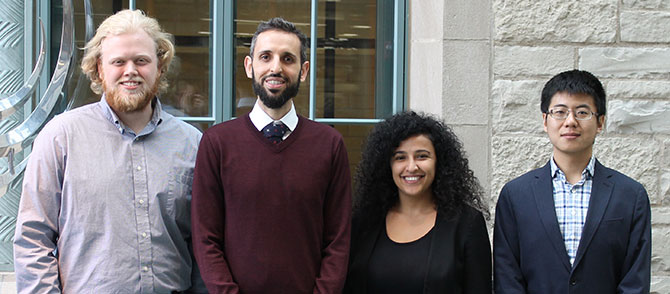The HABits Lab Presents Advanced Research in Ubiquitous Computing at ACM Ubicomp 2018
Three lab members presented a paper, poster, and demo exhibiting their exciting new work in health technology.

PhD Students from The Health Aware Bits (HABits) Lab presented their new work, which focuses on cultivating a healthy lifestyle assisted by technology at the 2018 ACM International Joint Conference on Pervasive and Ubiquitous Computing (UBICOMP 2018). The event was held at the Suntec Singapore Convention and Exhibition Center (colocated with ISWC 2018) October 9-11th in Singapore.
CS PhD Student Rawan Alharbi presented her paper, titled, "I Can't Be Myself: The Effects of Wearable Cameras on the Capture of Authentic Behavior in the Wild”, which encompassed her group (along with NU co-authors: Dr. Tammy Stump, Nilofar Vafaie, Dr. Angela F. Pfammatter, Dr. Bonnie Spring, and Prof. Nabil Alshurafa) designing an experiment with 3 "activity-oriented" wearable cameras and tested it on 24 participants (with and without obesity) in the wild.
Their project findings provide a model of understanding that is tied to empirical and theoretical findings that can provide guidance on improving the validity of observations with wearable cameras, thereby uncovering best practices for capturing authentic behaviors in free-living populations (aka "the wild"). Results of these findings have spawned a new area of research in designing privacy preserving activity-oriented cameras.
ECE PhD Student Zachary King presented a poster, titled, "Predicting Perceived Stress through Micro-EMA’s and Flexible Wearable ECG Device", The goal of which is to see how best to identify the optimal single item questions that correlate with intended stressors, and are most predictive from physiological signals (captured from a wearable ECG sensor). King is expanding on this preparation to design a framework for individuals to identify the optimal micro-EMA. This work (along with NU co-authors: Dr. Laurie Wakschlag, Dr. Judith Moskowitz, and Prof. Alshurafa) is funded as part of the Promoting Healthy Brain Project that aims to study the effect of stress during pregnancy on the neurodevelopment of the child.
CS PhD Student Shibo Zhang also prepared a live demo, titled, "HABits Necklace: A Neck-worn Sensor that Captures Eating Related Behavior and More" that monitors people’s eating habits (along with NU co-authors: Dr. Dzung Tri Nguyen, Zachary King, Jishnu Pradeep, and Prof. Alshurafa). People passed by to eat bananas while wearing the necklace, and analyzing the signal. The goal is to use these devices to characterize people’s eating behavior. The system collects proximity, inertial measurement unit (IMU), and ambient light.
About The HABits Lab (Directed by Prof. Alshurafa): We design, build and analyze end-to-end mHealth systems, while focusing on processing its data to help answer health-related questions. We focus on signal processing and machine learning techniques to process time-series data generated from passive sensors. To advance existing sensing techniques, a part of our lab focuses on the design of embedded systems.
The HABits Lab, it is the humanity within us and the desire to improve quality of life and healthcare costs that guide our solutions to the persisting health problems of our time through computer science and behavior science based research in passive sensing data analytics; helping us advance our ability to understand, detect, predict, and ultimately prevent problematic health habits.
The acm international joint conference on pervasive and ubiquitous computing (ubicomp) is the result of a merger of the two most renowned conferences in the field: pervasive and ubicomp. while it retains the name of the latter in recognition of the visionary work of mark weiser, its long name reflects the dual history of the new event.
